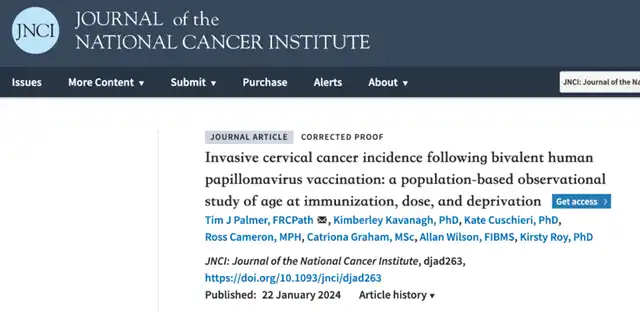HPV Vaccine Before 14: Zero Cervical Cancer Cases in 450K Women Study
- Normal Liver Cells Found to Promote Cancer Metastasis to the Liver
- Nearly 80% Complete Remission: Breakthrough in ADC Anti-Tumor Treatment
- Vaccination Against Common Diseases May Prevent Dementia!
- New Alzheimer’s Disease (AD) Diagnosis and Staging Criteria
- Breakthrough in Alzheimer’s Disease: New Nasal Spray Halts Cognitive Decline by Targeting Toxic Protein
- Can the Tap Water at the Paris Olympics be Drunk Directly?
HPV Vaccine Before 14: Zero Cervical Cancer Cases in 450K Women Study
- Should China be held legally responsible for the US’s $18 trillion COVID losses?
- CT Radiation Exposure Linked to Blood Cancer in Children and Adolescents
- FDA has mandated a top-level black box warning for all marketed CAR-T therapies
- Can people with high blood pressure eat peanuts?
- What is the difference between dopamine and dobutamine?
- How long can the patient live after heart stent surgery?
HPV Vaccine Before 14: Zero Cervical Cancer Cases in 450K Women Study
Data from a Study of 450,000 Women: No Cases of Invasive Cervical Cancer in Those Vaccinated Against HPV Before the Age of 14.
On January 22, a study titled “Invasive cervical cancer incidence following bivalent human papillomavirus vaccination: a population-based observational study of age at immunization, dose, and deprivation” was published in JNCI.

The research included approximately 450,000 women born between January 1, 1988, and June 5, 1996. Among them, about 40,000 women received the HPV vaccine between the ages of 12 and 13, 124,000 women received the vaccine at 14 years old or later, and 300,000 women did not receive the HPV vaccine.
The study’s findings revealed that among women vaccinated with the HPV vaccine between the ages of 12 and 13, regardless of the number of doses, no cases of invasive cervical cancer were recorded. In comparison to women who did not receive the HPV vaccine, those who received the vaccine between the ages of 14 and 22 and completed the full course of the bivalent vaccine had a significantly lower incidence of cervical cancer.
The unadjusted incidence rates for women from the most impoverished areas were significantly higher than those from the wealthiest regions. However, women from the most impoverished areas experienced a significant reduction in incidence rates after receiving the full three doses of the vaccine.
The study concludes that the bivalent HPV vaccine can prevent the development of invasive cervical cancer. Even with just one or two doses administered at the age of 12-13, beneficial effects were observed. In older age groups, the administration of all three doses is necessary to achieve statistically significant vaccine effectiveness. (Source: JNCI)
(source:internet, reference only)
Disclaimer of medicaltrend.org
Important Note: The information provided is for informational purposes only and should not be considered as medical advice.



